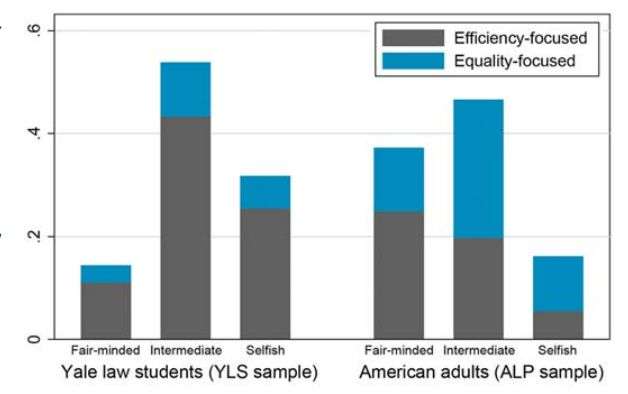September 18, 2015 report
Study suggests elite in US favor efficiency over equality

(Phys.org)—A team of four researchers from four different universities in the U.S. has conducted a study intended to discover why policymakers in that country continue to make decisions that favor the elite, despite an electorate that would seemingly prefer the opposite. In their paper published in the journal Science, the team describes their study and results and suggests that what they found may help explain the growing gap between the haves and have-nots.
It has been well documented that there is a growing gap between the wealthy in the U.S. and those that are less well off—what is not clear is why the trend continues despite the seeming power that non-elites hold as voters. In this new study, the researchers began with the assumption that the answer might lie in core beliefs of the elite. To find out, they sought out volunteers from among students at Yale Law School, a group that tends to come from elite families and who themselves tend to grow up to become members in their own right. Volunteer students were given tests that had been designed to determine an individual's views on the importance of efficiency versus equality under various circumstances. To make sure the answers given were not unique to law school students, the researchers also gave the same test to what they deemed an intermediate elite group of students at the University of California, Berkeley. Also, to provide a contrast, the team gave the same test to an Internet survey group—they served as means to determine how the general population feels about the same sorts of things.
The idea of the testing was to see if elite members of society place more value on efficiency in a given situation, than they do on equality—do they believe, for example, that it makes sense to give more to a project that will favor a very large number of people, than just a few, if the cost is low, or to give less if an expensive project will only benefit a few people. Those that lean more towards equality, on the other hand, would tend to parcel out funds in a way that benefits others regardless of cost—their aim is to level the playing field by redistributing wealth.
In studying the results, the researchers found the Yale students made decisions based on efficiency on average of 80 percent of the time, compared to 50 percent for the general population. They were also found to be much more likely to make purely selfish decisions. This, the authors claim, helps explain why policymakers in the U.S. make decisions that benefit them and their peers more so than the general population.
More information: The distributional preferences of an elite, Science 18 September 2015: Vol. 349 no. 6254 DOI: 10.1126/science.aab0096
ABSTRACT
We studied the distributional preferences of an elite cadre of Yale Law School students, a group that will assume positions of power in U.S. society. Our experimental design allows us to test whether redistributive decisions are consistent with utility maximization and to decompose underlying preferences into two qualitatively different tradeoffs: fair-mindedness versus self-interest, and equality versus efficiency. Yale Law School subjects are more consistent than subjects drawn from the American Life Panel, a diverse sample of Americans. Relative to the American Life Panel, Yale Law School subjects are also less fair-minded and substantially more efficiency-focused. We further show that our measure of equality-efficiency tradeoffs predicts Yale Law School students' career choices: Equality-minded subjects are more likely to be employed at nonprofit organizations.
Journal information: Science
© 2015 Phys.org


















